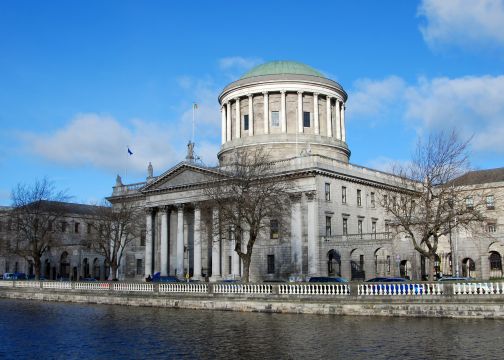A couple have taken a legal challenge over an inquest which they allege led to an “irrational” jury verdict that their baby died of brain damage as a result of natural causes.
Natasha Cummins and Aiden Spencer claim the Cork City Coroner did not adequately direct the jury on certain matters, particularly the use at University Hospital Waterford of the contraction augmentation drug Oxytocin during the delivery of their baby son.
Ms Cummins, accompanied by Mr Spencer, attended the hospital about noon on July 13th, 2018 for the purpose of giving birth.
High risk
It is claimed she was a high risk labour and hers was a high risk pregnancy as her first child was delivered by Caesarean section. Despite that, Oxytocin was administered to her, was continued beyond the recommended timeline and in contradiction of the hospital’s protocols, it is claimed.
When fully dilated some 34 hours after her admission to hospital, and after five hours of oxytocin, it is claimed she was directed to deliver her baby vaginally.
Ms Cummins, it is alleged, suffered a uterine rupture which resulted in a severe and sustained drop in the foetal heartbeat, causing a lack of oxygen to the baby’s brain.
Emergency caesarean
An emergency caesarean section was undertaken and the baby was born alive at 7.57pm on July 14th 2018 but ‘flat’. He was placed on life support and moved to Cork University Hospital where the life support was turned off just after midnight on July 18th 2018.
At the High Court on Monday, Joseph Dalby BL, for the couple, with an address in Cappoquinn, Co Waterford, applied ex parte (one side only represented) for leave to bring judicial review proceedings against Cork City Coroner Philip Comyn over his handling of the one-day inquest into the baby’s death.
The coroner’s September 10th 2020 recording of the inquest jury’s verdict stated the disease/condition leading to death was “acute hypoxic ischemic encephalopathy due to intra-uterine hypoxia due to placental malperfusion (an association of encephalopathy)”.
The jury had also recommended that, in view of the evidence heard during the inquest, that the Waterford hospital “take a look” at its current policies.
It is claimed the coroner failed to charge the jury with regard to its duty under the European Convention on Human Rights Act and Section 18A of the Coroners Acts to establish the circumstances in which the death occurred.
Seeking to quash verdict
The couple want orders quashing the verdict and directing the holding of an inquest to establish the cause of death and to make findings in respect of the circumstances in which the death occurred.
Mr Dalby said the medical care during Ms Cummins’ labour, and the use of oxytocin, are material circumstances relevant to the death of her baby and its causes.
The couple argue that a verdict of death by natural causes simpliciter, or at least without establishing the circumstances in which the death occurred, was irrational or unreasonable and not supported by the evidence before the inquest.
Judicial review
They claim the coroner did not properly charge the jury before retiring and the verdict was affected, or probably affected, by the pressure of time in which to reach a verdict. The jury retired to consider its verdict at 4.35pm and gave the verdict at 5pm.
The court building was required to close at 5pm and there was no option of reconvening the inquest there or in another place the next day or in the “foreseeable future”, it is claimed.
Mr Justice Charles Meenan said there was an arguable case concerning whether the jury was correctly charged and whether the verdict reached has a basis in law.
He granted leave for judicial review and directed UHW be put on notice of the proceedings. The couple have no concerns about their child’s treatment at CUH and it was not required to be put on notice, Mr Dalby said.







